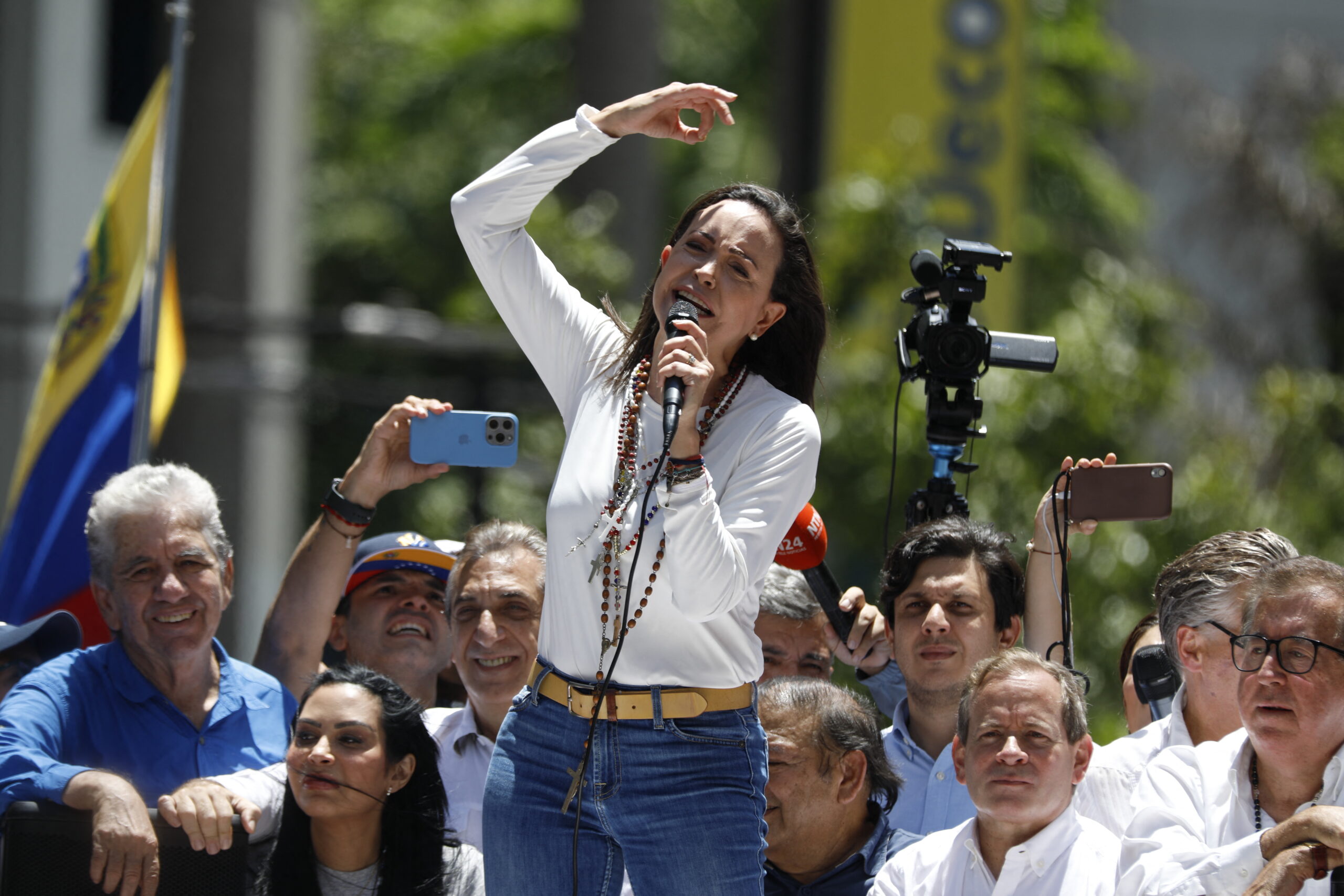U.S. President Donald Trump did not win the Nobel Peace Prize that he so publicly coveted. But he pocketed a big prize nonetheless. The prize is Venezuela.
On October 10, the Norwegian Nobel Committee announced that Venezuelan opposition leader María Corina Machado was the winner of the 2025 Nobel Peace Prize.
The committee praised her for “promoting democratic rights for the people of Venezuela and for her struggle to achieve a just and peaceful transition from dictatorship to democracy.” Declaring that “democracy is a precondition for lasting peace,” the committee judged that Machado “meets all three criteria stated in Alfred Nobel’s will for the selection of a Peace Prize laureate. She has brought her country’s opposition together. She has never wavered in resisting the militarisation of Venezuelan society. She has been steadfast in her support for a peaceful transition to democracy.”
Few in the mainstream media questioned the claim or bothered to check Machado’s actual record, a record that Miguel Tinker Salas, Professor of Latin American History at Pomona College and one of the world’s leading experts on Venezuelan history and politics, told me, “speaks for itself.” Tinker Salas highlighted that Machado supported a coup against a democratically elected government, was a leading organizer of a violent insurrection that left many dead, and endorses foreign military intervention in her country.
The historical record shows that, far from meeting the “three criteria… for selection of a Peace Prize laureate,” Machado spectacularly fails all three.
Machado did not bring Venezuela’s opposition together. The Nobel committee says that “Machado has been a key, unifying figure in a political opposition that was once deeply divided.” That, Yale University history professor Greg Grandin says, is not true: “Machado is not a unifier, as the committee said. She represents the most intransigent face of the opposition.” Grandin says that Machado has actually “constantly divided… and handicapped the opposition” by advancing a “more hardline” position “when the opposition was trying to come up with a more moderate position that could challenge the socialism of the 21st century that Chávez represented.”
More importantly, Machado has not fought for democracy. Leaving aside that an honest accounting of America’s record on coups and wars does not support the claim that “democracy is a precondition for lasting peace,” Machado’s work has not been in support of democracy. Though the Nobel Prize committee makes its case by focusing exclusively on the controversial 2024 election, Machado’s career didn’t start there. As Tinker Salas told me, “she supported the 2002 coup against a democratically elected president.” Machado was a signatory to the Carmona Decree, which suspended democracy, revoked the constitution, and installed a coup president. Machado’s record shows that it is not democracy she has fought for, but regime change.
In 2015, Machado joined two other opposition leaders in signing a National Transition Agreement, a framework for a new government Venezuelan officials claim was part of a U.S.-backed coup attempt.
Not only has Machado not fought for democracy in Venezuela, she has neither fought for a “peaceful transition to democracy” nor used “the tools of peace.”
Machado was, in the words of Tinker Salas, “a leading organizer of La Salida (the Exit) in 2014, an attempt at insurrection.” La Salida intended to provoke a crisis that would force Maduro from office. To set that crisis in motion, Machado sought to mobilize forces and take to the street with the express intent of bringing about regime change.
La Salida was not the stuff of Nobel Peace Prizes. The illegal protests sought to bring about regime change by blocking traffic and using barricades, fires, and oil poured on lanes used by motorcycles. Buses were burned, and many people died during the conflict.
But Machado did not only support domestic violence. She also supports international violence. Greg Grandin told The American Conservative that Machado “100 percent supports Trump and Marco Rubio’s contention that the Venezuelan government isn’t a state, and Maduro isn’t a president but a narco ‘kingpin’.” She agrees that “targeting him the way the U.S. targeted Manuel Noriega decades ago in Panama is justified.” Machado, Grandin said, is “absolutely aligned with the Trump administration’s terrorist policy of blowing go-fast boats out of the water in the Caribbean.” Tinker Salas also told me that Machado “has endorsed a foreign intervention of the country that would further destabilize not only Venezuela but the region.”
Machado not only supports Rubio, but Rubio supports Machado. In August 2024, Rubio, the main force behind the Trump administration’s violence against Venezuela, joined seven other signatories in nominating Machado for the Nobel Peace Prize. They urged that Machado’s “unyielding dedication to the pursuit of peace and democratic ideals make her a most deserving candidate for this prestigious award.”
Subscribe Today
Get daily emails in your inbox
Machado has also supported the U.S. sanctions against Venezuela, which have done nothing to bring about regime change, but have done much to cripple the Venezuelan economy. This has exacerbated a humanitarian crisis, leading to shortages of basic goods, plunging much of the population into poverty and killing tens of thousands.
Trump has notified Congress that the U.S. is now in formal “armed conflict” with the drug cartels of Venezuela. He has stopped all diplomatic outreach to Venezuela and has ordered fatal strikes on at least four small boats off the coast of Venezuela. By delegitimizing the Maduro government and legitimizing Machado and her violent opposition to democracy and longstanding support for U.S. military intervention, the Nobel committee has helped to remove any obstacles on the road to war.
“Giving Machado the award,” Grandin told me, “is the opposite of peace.”
